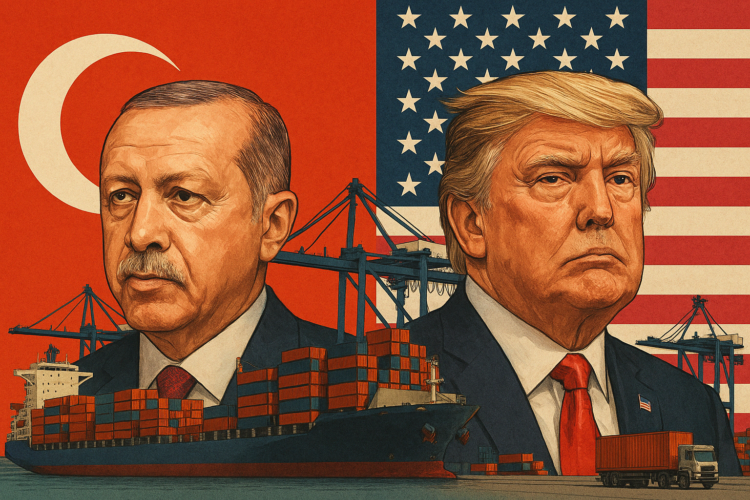
From Threats to Partnership: Turkey Profits from Trump's Trade Game
It seems that Trump spared Turkey when setting tariffs – unlike the EU and China. The Turkish economy wants to profit from this and increase exports. But for that, it needs to meet certain conditions.
"I have great relations with a man named Erdogan" – this is how US President Donald Trump described his relationship with Turkish President Recep Tayyip Erdogan earlier this week in the Oval Office, sitting next to Erdogan's political rival Benjamin Netanyahu. "I like him. He likes me. We’ve never had a problem," the American president added.
This isn't entirely true: On October 7, 2019, Trump threatened to "destroy the Turkish economy" and said he had already done so once. In a letter dated October 16, 2019, sent to Erdogan, Trump urged the Turkish president to strike a "good deal" with him. And he emphasized: "I do not want to be responsible for destroying the Turkish economy."
The Turkish economy has faced significant challenges over the last six years – the Turkish lira has lost significant value. In March 2007, one US dollar was worth about 1.30 Turkish lira, in October 2019 it was 5.79, and today it’s 38.06 lira.
Although Trump may have harmed the Turkish economy back then, it seems that today the two heads of state are agreeing better than before. In fact, Turkey is one of the countries least affected by Trump's tariff policy: a "mere" 10 percent tariff was imposed on Turkish goods. Trump's 90-day tariff pause and the general reduction to ten percent for all countries except China temporarily level the playing field with Turkey.
New Hope?
Unlike the negative sentiment in Europe, Turkish business representatives do not see the tariffs as a crisis – but as an opportunity. They are convinced: with the right trade policy, Turkey can benefit from the new situation.
The new rules of the game by Donald Trump could especially help Turkish exporters gain an advantage in the US market, says Bulent Ajmen, vice president of the Mediterranean Furniture, Paper, and Wood Products Exporters Association (AKAMIB).
"The United States has been our main market for the last three years. Our exports are increasing every month. The intensification of the tariff war allows Turkey to gain market share in the US in areas such as the chemical and automotive industries, furniture and electronics production. We must definitely make the most of this advantage," says Ajmen.
The trade volume between Turkey and the US exceeds 30 billion US dollars. The US is currently Turkey's second most important trading partner – after Germany. Turkish exports to the US have increased by an average of 16 percent over the last five years, while US exports to Turkey have risen by 9 percent. According to the Turkish Exporters' Association (TİM), Turkey exported goods worth around 21.1 billion US dollars to Germany in 2023, while exports to the US amounted to about 14.8 billion. According to the Turkish Statistical Institute (TÜİK), exports to the US reached 16.3 billion US dollars by the end of 2024.
Turkey primarily exports chemical products, automotive parts, clothing, carpets, and electronics to the US. At the same time, it imports more than half of its cotton – for textile products which it then exports to the US.
According to Şeref Fayat, a representative of the textile industry in the Union of Turkish Chambers of Commerce and Commodity Exchanges (TOBB), Trump’s high tariffs on imports from China and the European Union could increase the visibility of Turkish products in the US market. "Now we must act quickly. We can use the problems that China, Vietnam, and Cambodia will likely face to our advantage," Fayat believes.
Criticism of Turkey's Trade Policy
Fayat is optimistic about the future of trade with Trump’s America. "I don't expect Turkey to be negatively affected by the new situation." He suggests negotiating with the US for limited tariff-free trade. "This is a very important opportunity, but we must carefully monitor how our most important trading partner, the European Union, will be affected by American tariff policies," he warns.
However, among some other governments, there is cautious optimism: the potential is sufficient, but many Turkish companies are not ready to take advantage of it, says Murat Akjuz, former president of the Chemical Products Exporters Association (IKMIB). "I believe that the new US tariff policy is a great opportunity for Turkey. At the same time, I think that exporters in Turkey are not adequately prepared." In the past, he says, many opportunities were missed because "a sustainable trade policy was not followed."
Fayat also notes shortcomings: access to US consumers for Turkish products is limited – due to a lack of shopping centers and warehouses. He criticizes the policy: "Although Trump announced these tariffs a long time ago, unfortunately, we have not made the necessary preparations."
Turkey as a Production Hub?
In addition to exports, Turkey could establish itself in another field as a strategic player: as a manufacturing location for Asian companies. Specifically, Turkey could invite companies from China to produce in Turkey – to circumvent high tariffs. Its geopolitical position as a bridge between the East and West supports this.
"We must explain to those countries – especially China – the advantage of relocating production to Turkey," says Akjuz. "We should actively encourage investments in our country. Turkey, with its infrastructure and the potential of a skilled workforce, is well-prepared for this," believes Akjuz.





